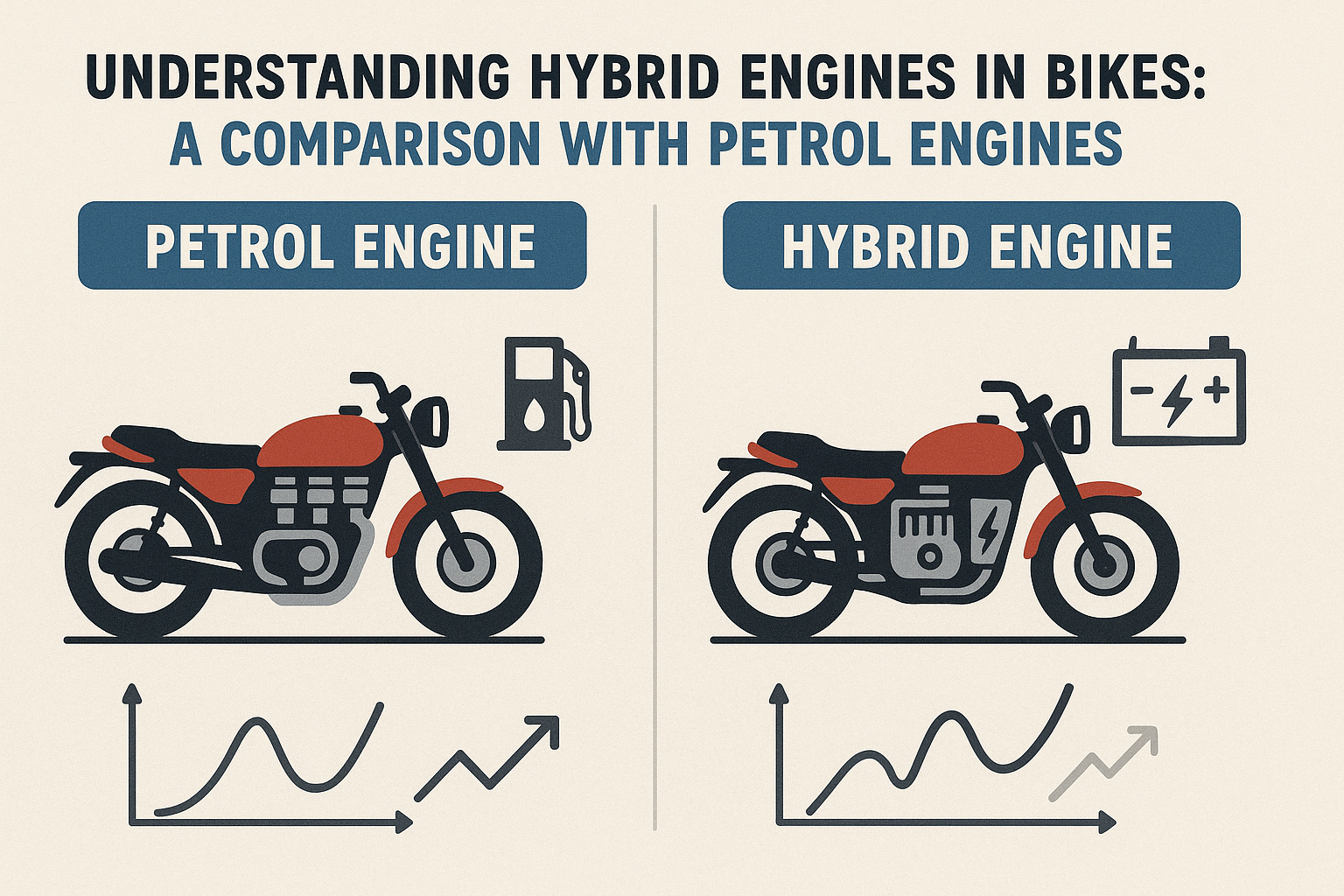India’s two-wheeler industry is at a turning point. With rising fuel prices and growing environmental concerns, hybrid bikes are emerging as a promising alternative to traditional petrol motorcycles. But what exactly is a hybrid bike, and how does it differ from what we’ve always known? This guide breaks down the core differences, technology, benefits, and the future of hybrid engines in the Indian motorcycle landscape.
What Is a Hybrid Engine in a Motorcycle?
A hybrid motorcycle engine uses two power sources:
- An Internal Combustion Engine (ICE) that runs on petrol
- An electric motor system, usually a Smart Motor Generator (SMG), that supports the engine
The combination is designed to improve fuel efficiency, reduce emissions, and provide smoother acceleration in city traffic.
Unlike full electric vehicles (EVs), hybrid bikes do not need to be plugged in to charge. Their small batteries are automatically charged during riding using regenerative braking or the engine’s own motion.
Types of Hybrid Systems in Motorcycles
| Type | Description | Example |
|---|---|---|
| Mild Hybrid (SMG) | Provides electric assist to support petrol engine | Yamaha FZ-X Hybrid |
| Full Hybrid | Can run purely on electric or petrol, switches between both | Concept stage only |
| Plug-in Hybrid (PHEV) | Can be charged via external charger and use battery power | Not available in India |
| Most hybrid bikes in India currently use the mild-hybrid approach, which does not require external charging. |
How Hybrid Bikes Work
- Silent Start: Electric motor silently starts the engine
- Idle Start-Stop: Engine shuts off at signals or traffic stops and restarts when clutch/throttle is engaged
- Torque Assist: Electric motor helps during acceleration to reduce fuel load
- Regenerative Charging: Braking energy charges the hybrid battery automatically
These functions reduce the strain on the petrol engine, leading to better mileage and lower emissions.
Hybrid vs Petrol Engines in Bikes
| Feature | Hybrid Bike Engine | Traditional Petrol Engine |
|---|---|---|
| Fuel Efficiency | Better mileage due to electric support | Standard mileage |
| Engine Start | Silent, motor-assisted | Audible engine crank |
| Emissions | Lower CO₂ emissions | Higher emissions |
| Urban Ride Comfort | Smooth acceleration, auto start/stop | Clutch-heavy, jerky in traffic |
| Maintenance | Slightly complex due to hybrid components | Easier to maintain |
| Cost | ₹10K–₹20K more than petrol-only bikes | More affordable upfront |
| Charging Required | No | No |
| Government Support | Likely future incentives | Neutral |
Benefits of Hybrid Bikes in India
- Enhanced fuel economy, especially in urban traffic
- Lower emissions without needing full EV infrastructure
- No change in user behavior; no charging required
- Great for delivery riders, daily commuters, and students
- Quieter, smoother throttle response
Limitations of Hybrid Bikes
- Currently limited model availability
- Higher purchase cost compared to basic petrol models
- Fewer service centers trained in hybrid components
- No full-electric riding option (yet)
Why Manufacturers Are Embracing Hybrid Tech
Hybrid bikes allow OEMs to comply with tightening emission norms (BS6 and future BS7) while keeping rider experience familiar. It’s a step towards electrification without full reliance on EV infrastructure.
Manufacturers can add features like:
- Start-stop system
- Regenerative braking
- Digital cluster with connectivity
This makes their bikes future-ready and appealing to young riders who demand tech-enhanced rides.
Current Examples of Hybrid Bikes in India
- Yamaha FZ-S FI Hybrid
- Yamaha FZ-X Hybrid
These models include SMG units that assist the engine and offer digital instrument clusters with Bluetooth, navigation, and ride statistics.
Future of Hybrid Bikes in India
- More 125cc–160cc models are expected to adopt hybrid features
- Honda, Hero, and Bajaj are likely to enter the hybrid space
- Hybrid scooters may also emerge with idle start-stop and power assist
- Hybrid bikes may receive green mobility incentives
Government policies may eventually include mild-hybrid motorcycles in their eco-friendly vehicle schemes, accelerating adoption.
Final Thoughts
Hybrid engines in bikes offer a realistic and environmentally responsible upgrade from traditional petrol bikes. While they don't yet replace full EVs, they serve as an important transitional step for millions of riders.
With the added benefits of fuel efficiency, reduced emissions, and smart features, hybrid bikes are not just a trend—they are a smart investment for India’s commuting future.


